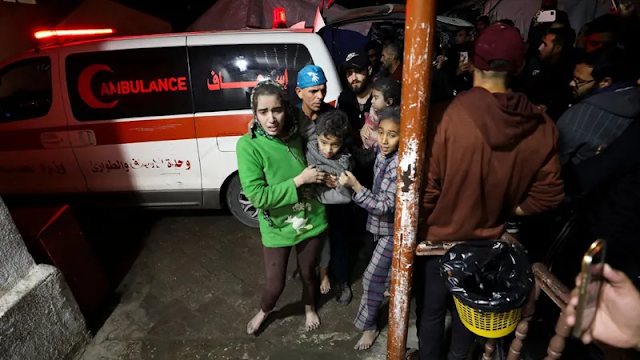Israeli airstrikes continue in Gaza ahead of a ceasefire agreement and a hostage exchange deal with Hamas, expected to take effect on Sunday, pending approval by the Israeli cabinet.
According to Gaza's Hamas-run civil defense agency, the strikes killed 73 people overnight following the announcement of the deal. Among the victims were 12 residents of a residential block in Gaza City's Sheikh Radwan neighborhood, the health ministry reported.
The Israeli Defense Forces initially stated that a "fallen projectile" had been identified in southern Israel on Thursday but later clarified this as a misidentification.
Israel has conducted airstrikes in the lead-up to ceasefire agreements in the past, including in Lebanon, where heavy bombing struck Beirut just hours before a November ceasefire took effect.
In Gaza City's Baptist Hospital, Dr. Amjad Eliwah described a "bloody night," saying staff worked relentlessly as a steady flow of injured people arrived. "The injured kept on coming," he told the BBC. "The dead were sent directly to the morgue."
Dr. Eliwah shared the emotional shift experienced by many: "For a little while, everyone was happy and joyful" at the news of the ceasefire. "Then the same people who were happy were dead."
Follow Live Updates on This Story
- Dozens Killed as Israeli Strikes Continue Ahead of Ceasefire
- What We Know About the Agreement
- Analysis: Long-Overdue Deal May End Killings but Not the Conflict
- History of the Israel-Gaza War Explained
Israeli Prime Minister Benjamin Netanyahu was expected to ratify the Gaza ceasefire agreement in parliament on Thursday. However, his office has accused Hamas of "reneging" on parts of the deal, causing a "last-minute crisis."
The Israeli cabinet will delay convening until Hamas agrees to "all elements of the agreement," according to Netanyahu’s office.
Meanwhile, a senior Hamas official told the BBC that the group remains committed to the agreement mediated by Qatar and Egypt. Khalil al-Hayya, the head of Hamas's delegation, has reportedly informed both countries of their approval of all terms.
Finance Minister Bezalel Smotrich and National Security Minister Itamar Ben Gvir, two hardline right-wing members of the Israeli cabinet, have long threatened to resign if the ceasefire proceeds. While this could trigger fresh elections in Israel, analysts note their resignations would not block the deal if Netanyahu decides to move forward.
Qatar’s prime minister, who helped mediate the negotiations, has called for "calm" from both sides ahead of the ceasefire's first six-week phase.
Under the agreement:
- 33 hostages, including women, children, and elderly individuals, will be exchanged for Palestinian prisoners held in Israeli jails.
- Israeli forces will withdraw to the east, away from Gaza’s densely populated areas.
- Displaced Palestinians will begin returning to their homes.
- Hundreds of aid trucks will be permitted to enter Gaza daily.
Negotiations for the second phase, expected to secure the release of the remaining hostages, a full Israeli troop withdrawal, and a return to "sustainable calm," will begin on the 16th day.
The third and final phase will focus on the return of any remaining hostages' bodies and the reconstruction of Gaza, a process that could take years.
Achim Steiner from the United Nations Development Programme spoke to the BBC’s Newsday programme, highlighting the immense challenge of rebuilding Gaza due to the widespread devastation caused by the conflict.
9
He explained that 40 million tons of "toxic" rubble must be cleared before residents can return to what remains of their homes.
"This is a very complex undertaking that we are now confronted with," Steiner said.
Israel launched a military campaign to dismantle Hamas, which is designated as a terrorist organization by Israel, the US, and other nations, in retaliation for an unprecedented cross-border attack on October 7, 2023. The attack resulted in the deaths of approximately 1,200 people and the abduction of 251 others.
Since then, more than 46,788 people have been killed in Gaza, according to the Hamas-run health ministry. The majority of Gaza's 2.3 million residents have been displaced, with widespread destruction and severe shortages of food, fuel, medicine, and shelter. Aid organizations are struggling to deliver assistance to those in need.
Israel reports that 94 hostages are still being held by Hamas, with 34 presumed dead. Additionally, four Israelis were abducted prior to the war, two of whom are confirmed dead.












0 Comments